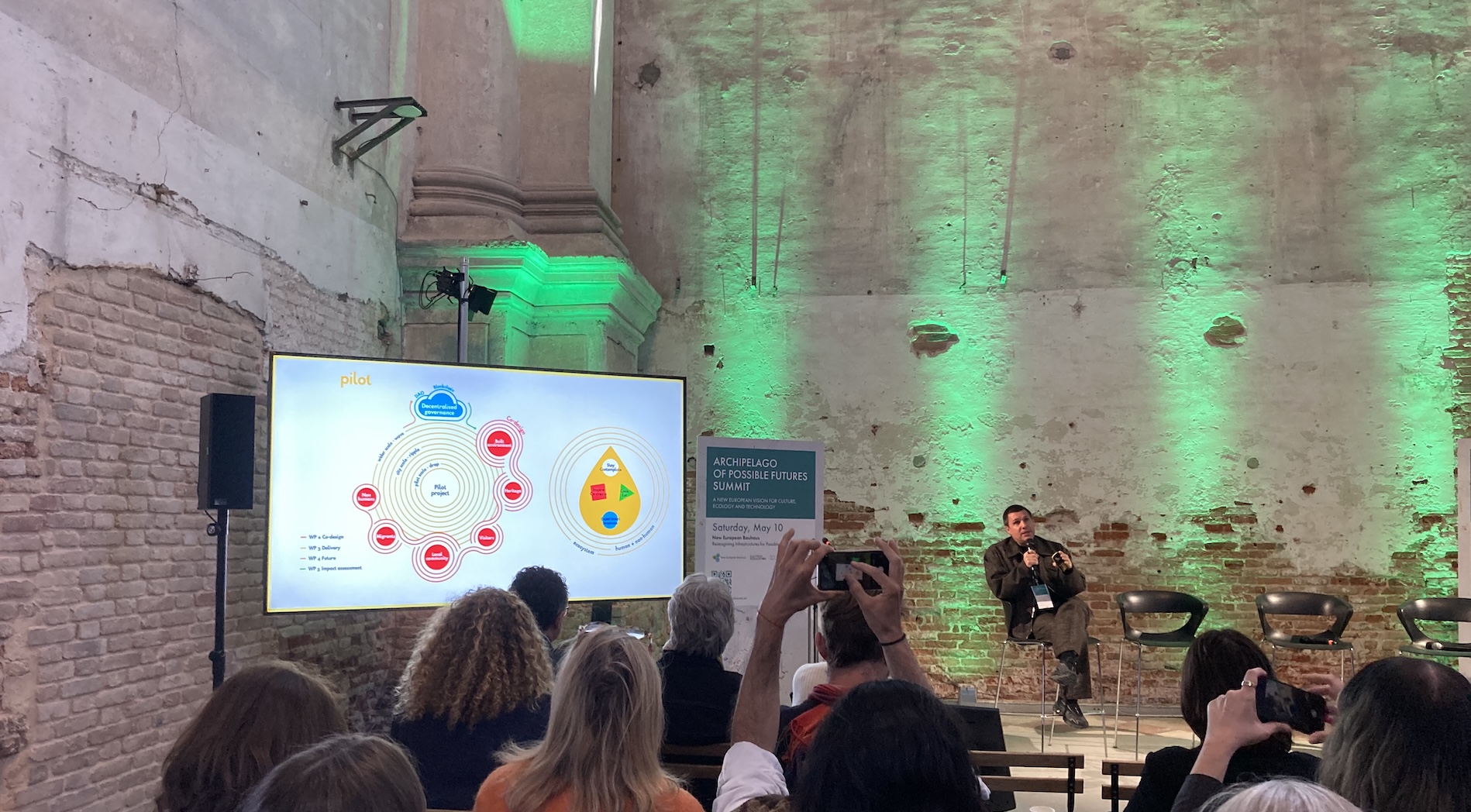May 26, 2025
Part 4 — Bauhaus of the Seas: New Ways of Knowing the Sea
How can we think with the sea instead of about it from land? Our last piece from the Venice summit.

In 2022, even before founding Munkun, we decided to organize a satellite event of the first New European Bauhaus Festival, which we called Creadores de futuros. At a time when information about the initiative was still scarce, one of the resources that most inspired us was the Bauhaus of the Seas Sails (BOSS) website. Especially its manifesto, its aesthetics, and the wealth of news and materials available helped us better understand the values of the NEB and shape our first projects in that direction. There was a mix of ecological sensitivity, artistic ambition, and political intuition that deeply connected with what we were trying to imagine. Since then, we have followed the evolution of the project as a reference, and when we decided to attend the Archipelago of Possible Futures summit in Venice, our first goal was to meet the people behind Bauhaus of the Sea Sails. I enjoyed the presentation and was also able to interview Markus Reymann, one of the project’s drivers from TBA21 and TBA21–Academy.
How do we think from and with the sea rather than about the sea from land?
Bauhaus of the Seas Sails is one of the six flagship demonstrators of the New European Bauhaus, funded by the European Union. Its main objective is to promote solutions towards climate neutrality in coastal cities, focusing on sustainability, inclusion, and aesthetics. The project seeks to reconnect communities with their aquatic environments through cultural, educational, and co-design practices, fostering a more intimate and collaborative relationship with the sea.
Coordinated by the Instituto Superior Técnico of Lisbon, the consortium brings together 18 academic, cultural, and governmental partners in seven cities and regions of Europe: Lisbon and Oeiras (Portugal), Venice and Genoa (Italy), Hamburg (Germany), Malmö (Sweden), and the Rhine-Meuse-Scheldt delta (Netherlands and Belgium). Each of these locations develops local pilots adapted to their specific contexts, addressing challenges such as ecosystem restoration, decarbonization of the blue economy, and improving knowledge about the sea.
During his intervention at the Archipelago of Possible Futures summit in Venice, Markus Reymann proposed thinking of the sea not as an abstract void or a resource to exploit, but as a space traversed by power relations, affections, memories, and material tensions. Bauhaus of the Seas Sails, he explained, does not limit itself to documenting: it activates presences, generates links, and keeps situated research processes open. As he summarized in a phrase that resonated strongly in his talk and in our subsequent interview:
“We are not interested in representing the ocean. We are interested in relating to it.”
One of the decisions that exemplifies the previous idea is the governance model adopted by the project, called Zoöp. This innovative model developed by Nieuwe Instituut, one of the project’s partners, seeks to integrate the interests of non-human life into the decision-making processes of human organizations. To achieve this, each organization that becomes a Zoöp incorporates into its structure a Speaker for the Living, an independent figure responsible for representing the voices of non-human entities in organizational deliberations. This approach promotes a practice of ecological regeneration and an economy that supports all forms of life, known as zoönomy. The application of this model in the Bauhaus of the Seas project is well summarized in this video.
The Zoöp model is especially inspiring to me for its ability to institutionalize an ethic of relation rather than representation. By formally including non-human life in governance, Zoöps advance towards a more equitable coexistence between species. It’s an approach that deserves deeper exploration, and I will possibly dedicate a future article to analyzing its implications and applications.
Fluid Processes: Fostering New Spaces of Co-creation
In our conversation, an idea from Markus seemed especially revealing:
“Water invites us to think in terms of process, of fluidity and emergence, rather than in terms of linearity and product.”
In this way, he highlights the contribution of this type of project: it proposes a form of knowledge oriented towards sustaining living dynamics, where the value lies in what emerges from the process and the relationship, rather than in achieving predefined results.
Here is a first cut of the interview
Possible Futures
Creadores de futuros was, for us, the beginning of a path: a collaborative way of working that led us to connect science, art, and technology. Since then, we have sought spaces where that mix thrives, and the summit in Venice was one of them. Listening to Markus Reymann and the rest of the participants — especially the artists — reaffirmed a vision and renewed our energy to continue exploring. We returned with ideas, tools, and alliances that will continue to inspire us. And we know that many of those experiences will accompany us in the futures we want to keep creating.